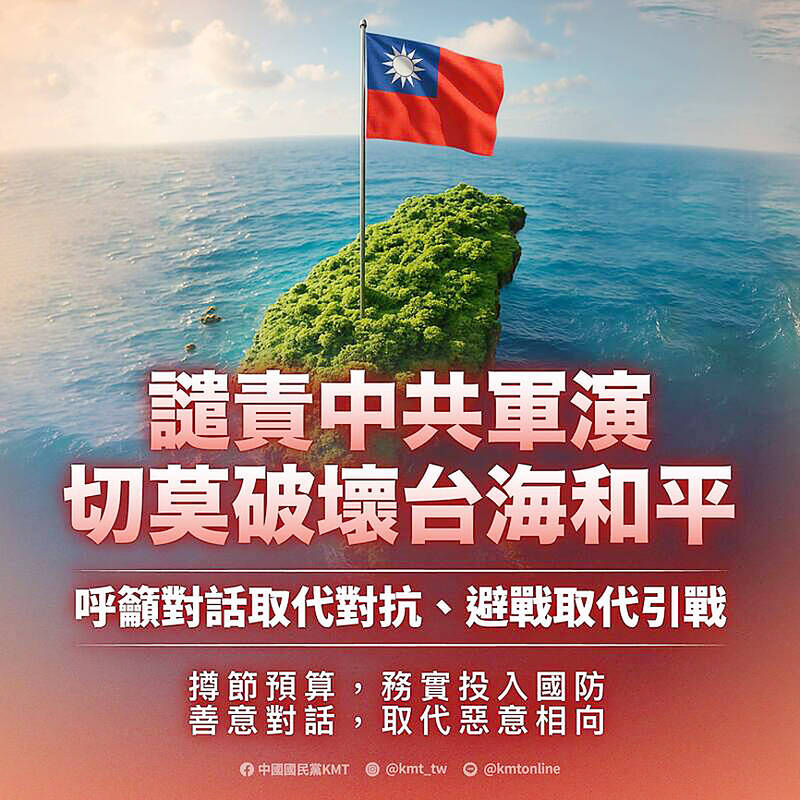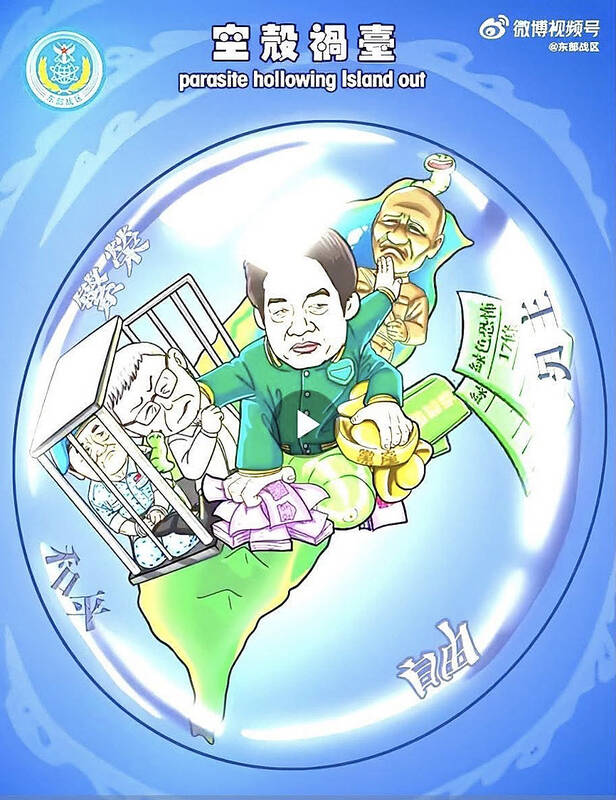The Chinese Nationalist Party (KMT) is maintaining close ties with Beijing, the Democratic Progressive Party (DPP) said yesterday, hours after a new round of Chinese military drills in the Taiwan Strait began.
Political parties in a democracy have a responsibility to be loyal to the nation and defend its sovereignty, DPP spokesman Justin Wu (吳崢) told a news conference in Taipei.
His comments came hours after Beijing announced via Chinese state media that the Chinese People’s Liberation Army’s Eastern Theater Command was holding large-scale drills simulating a multi-pronged attack on Taiwan.

Photo: Liao Cheng-hui, Taipei Times
Contrary to the KMT’s claims that it is staunchly anti-communist, KMT Deputy Chairman Andrew Hsia (夏立言) a day earlier visited top Chinese Communist Party (CCP) officials in Henan Province, Wu said, adding that Hsia did not condemn Bejing’s communism, saber rattling or disruption of regional peace, but instead voiced support for the so-called “1992 consensus.”
The “1992 consensus” — a term that former Mainland Affairs Council chairman Su Chi (蘇起) in 2006 admitted making up in 2000 — refers to a tacit understanding between the KMT and the CCP that both sides of the Taiwan Strait acknowledge that there is “one China,” with each side having its own interpretation of what “China” means.
Hsia’s failure to stand up to Beijing proved that claims of being anti-communist were just empty words by KMT Chairman Eric Chu (朱立倫) to placate voters, Wu said.

Photo: Screen grab from the Chinese Nationalist Party’s (KMT) Facebook page
Separately, the KMT, responding to the reports of China’s military drills, called on “the other side [of the Taiwan Strait] to lay down its arms” amid what it called “spiraling hostility across the two sides” brought about by the national security measures of the administration of President William Lai (賴清德).
The Lai administration should replace confrontation with dialogue and avoid war instead of provoking one, it added.
The KMT’s self-styled “2D strategy” — advocating “defense” and “dialogue” — is the best expression of patriotism and hope for defending Taiwan’s security, it said.

Photo: Screen grab from Sina Weibo
The party is to continue supporting military service salary and benefit increases as the foundation of national defense, it said.
Meanwhile, the Taiwan People’s Party (TPP) in a statement protested and condemned the actions of China’s Eastern Theater Command and the CCP’s threat to take Taiwan by force.
Beijing’s military actions conducted in the name of suppressing Taiwanese independence is an attack on all Taiwanese and international norms, the TPP said.
On the Eastern Theater Command’s release of propaganda, including an image showing Lai choking former Taipei mayor Ko Wen-je (柯文哲), the TPP’s founding chairman, and locking him in jail — linking its drills to Ko’s detention — the TPP said that Ko’s legal situation is not Beijing’s concern.
Taiwan is a democracy and uses the rule of law to resolve problems, it said, adding that the nation would not allow outside forces to sow division or meddle in its internal affairs.
The TPP supports efforts to bolster national defense and democratic resilience without forgoing the pursuit of diplomatic discourse to avoid further escalation of tensions across the Strait, it added.
Su Tzu-yun (蘇紫雲), a research fellow at the Institute for National Defense and Security Research, said that the drills are a response to new military strategies recently released by the US, which prioritize deterring a Chinese invasion of Taiwan.
Whenever the international community shows significant support for Taiwan, China uses military exercises to intimidate the nation, Su said.
With the downfall of He Weidong (何衛東), vice chairman of China’s Central Military Commission, and the disappearance of Eastern Theater Command Director Lin Xiangyang (林向陽), the Chinese military is also using the drills to control morale, Su said.
Additional reporting by Lin Che-yuan and Chen Yu-fu

Nipah virus infection is to be officially listed as a category 5 notifiable infectious disease in Taiwan in March, while clinical treatment guidelines are being formulated, the Centers for Disease Control (CDC) said yesterday. With Nipah infections being reported in other countries and considering its relatively high fatality rate, the centers on Jan. 16 announced that it would be listed as a notifiable infectious disease to bolster the nation’s systematic early warning system and increase public awareness, the CDC said. Bangladesh reported four fatal cases last year in separate districts, with three linked to raw date palm sap consumption, CDC Epidemic Intelligence

The manufacture of the remaining 28 M1A2T Abrams tanks Taiwan purchased from the US has recently been completed, and they are expected to be delivered within the next one to two months, a source said yesterday. The Ministry of National Defense is arranging cargo ships to transport the tanks to Taiwan as soon as possible, said the source, who is familiar with the matter. The estimated arrival time ranges from late this month to early next month, the source said. The 28 Abrams tanks make up the third and final batch of a total of 108 tanks, valued at about NT$40.5 billion

Two Taiwanese prosecutors were questioned by Chinese security personnel at their hotel during a trip to China’s Henan Province this month, the Mainland Affairs Council (MAC) said yesterday. The officers had personal information on the prosecutors, including “when they were assigned to their posts, their work locations and job titles,” MAC Deputy Minister and spokesman Liang Wen-chieh (梁文傑) said. On top of asking about their agencies and positions, the officers also questioned the prosecutors about the Cross-Strait Joint Crime-Fighting and Judicial Mutual Assistance Agreement, a pact that serves as the framework for Taiwan-China cooperation on combating crime and providing judicial assistance, Liang

A group from the Taiwanese Designers in Australia association yesterday represented Taiwan at the Midsumma Pride March in Melbourne. The march, held in the St. Kilda suburb, is the city’s largest LGBTQIA+ parade and the flagship event of the annual Midsumma Festival. It attracted more than 45,000 spectators who supported the 400 groups and 10,000 marchers that participated this year, the association said. Taiwanese Designers said they organized a team to march for Taiwan this year, joining politicians, government agencies, professionals and community organizations in showing support for LGBTQIA+ people and diverse communities. As the first country in Asia to legalize same-sex